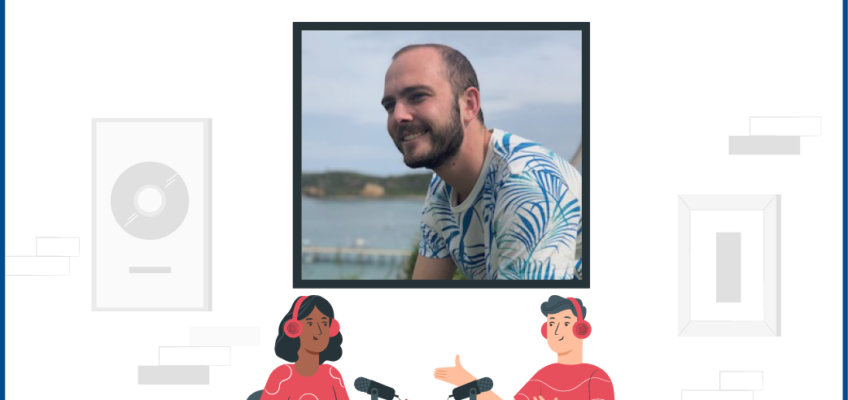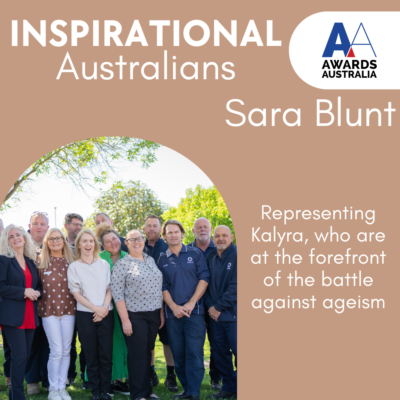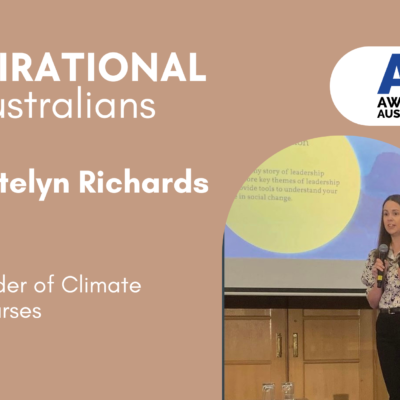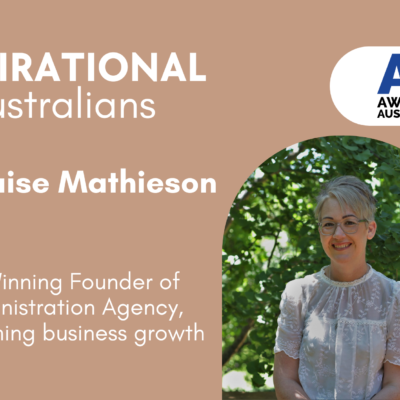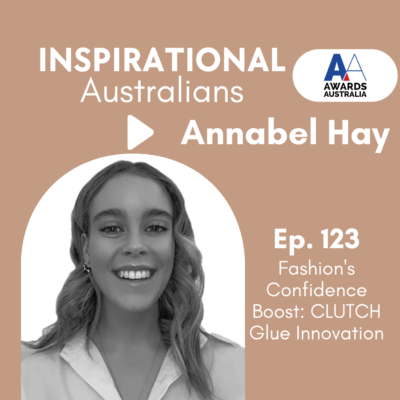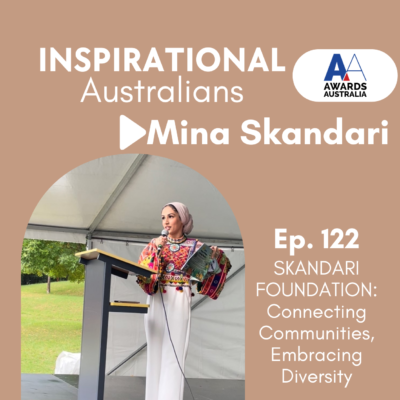In this week’s episode, Geoff is talking to Maurice Schill who is a Finalist in the 2021 7NEWS Young Achiever Awards, Victoria.
Maurice is providing a digital space where people are appreciated. After teaching himself how to code and develop digital platforms, Maurice developed JuJu (Jujuapp.io), an app that is transforming the way a business thinks about its reward and recognitions by tapping into a fundamental truth – employees have a need to be appreciated for their contributions at work. Maurice has developed a systematic way to help organisations deliver on this and in return, reduce turnover while creating lasting and sustainable engagements. At least six companies currently use JuJu, including YMCA Australia and BenchMedia. Maurice has delivered over ten workshops on gratitude, appreciation and company culture.
In this episode:
- We learnt the difference between Recognition and Appreciation
- As Maurice explains it, think of JuJu as “Twitter for Appreciation”
- Want to learn coding? Maurice suggests bubble.io as a good place to start
Links
Want to know more about JuJu – check out the website here
Connect with Maurice on LinkedIn
Want to know how to Rate and Review a podcast, see this article
Follow us on our Inspirational.Australians Instagram Page
Want to nominate someone? (It can take as little as 2 minutes to recognise someone making a difference)
Like some more information on Corporate Partnership?
Transcript
Welcome to the inspirational Australian’s podcast, where we cha to people making a difference in their communities and in the lives of others. And here is your host for today, Geoff Griffin. Welcome to the inspirational Australian’s podcast, stories of inspiring achievements and community contribution. Every week we will celebrate an award program category winner or finalist. We hope you’ll be inspired and encouraged to know that Australia is in good hands, together with our corporate partners and not for profit partners, aA Australia, showcase ordinary people from right across Australia, doing extraordinary things. If you enjoy hearing the stories of our inspirational Australians, please subscrib, rate us and review us. We really appreciate it. I’m really excited to chat with this week’s podcast guest, who is a true inspiration to anyone, he has a vision, but not necessarily the skills, he didn’t let that get in his way though, Maurice Schill is an extraordinary human, taught himself how to code and develop digital platforms, so that he could create positivity and make a difference in the workplace. Maurice has a real passion for understanding the difference between appreciation and recognition. Welcome to the podcast, Maurice. Thank you, Geoff, it’s good to be here today. So I’m looking up and really looking forward to today. You’re an amazing young man. You’ve got real charisma about you. It’s really great to be chatting with you. Congratulations for all you do, the way you connect businesses with their employees. I, for one I’m very interested in what you say is the difference between appreciation and recognition and why you feel they aren’t the same. Oh, it’s a, it’s a good question and I’ve had to explain it many times and I’m still looking for the perfect way to, to really showcase it. But I guess, I think the best way to, to look at it. But think back at the last. What was the last present that you received the gift and it doesn’t have to be an actual thing. It might have been a gesture. It might have been someone something did for you. But something that, that really touched you emotionally where you went, wow, this person is really considered well, what so? So can, does anything come to mind there? I think initially the first thing that came to mind was giving a thank you is, is really special, particularly when it’s not expected. So in terms of that, I really honor someone thanking me for something that I’ve done. So that would be the first thing that comes to mind. Ok. So that’s, that’s probably wasn’t what I was going for looking for, but that’s all I can do is give you, I’ll give you my second thing that come to mind that the recent award nights had a number of comments about a tie and pocket square that were matching and I was really delighted to let people know that my wife had bought those for me as a gift, and quite possibly she has better taste than I do. So that was one gift that I received that really received some acknowledgement. So I was pretty tough to get that acknowledgement. Yeah. Awesome. So that’s the reason I asked the question I bring it up is because it’s, it has to do with the emotional impact it has on you. Appreciation is a lot more emotionally laden, if you want to put it that way, it has some deeper connotation and meaning to the receiver, but also to the giver. It really does require us to dig a bit deeper. It’s not just saying, hey, good job on that in passing or giving someone a high five, but really considering and saying, well, this is something that matters to me and I care about. And I want to to let you know about that, right? Whether that is a job well done, it really comes down to how it’s communicated. And recognition is, is often easy to do and more superficial. And probably the reason why it’s more popular or frequent. It requires less vulnerability requires us to open up a little bit less and less emotion. And especially in the workplace where it’s not generally the space where emotion is, is invited to be shared openly by everyone. You don’t generally get as much appreciation yet without that emotional connection ends up being empty words, don’t know if that helps you see. That’s spot on because a pair of socks i received for my birthday didn’t certainly get appreciated as much as the tie and pocket square. Maybe because they weren’t appreciated as much by others as well to socks and then maybe thought and not sure about this a gift. But yes, I think you make a really good point about the difference. I really like that. I mean, to just around the gift idea that my fiance, a couple years ago, gave me some pajama pants and their silly pajama pants with pizza and space people and sort of cartoonish. And I was like, these are for little kids and stuff. When I first got it, I wasn’t happy about it, but then I started wearing them a few times and I and they’re really comfortable and then they sort of had a little bit of silliness to it. So I really started enjoying them. So although at first I didn’t appreciate the present now I really do and every time I put it on, I really appreciate having them and that gesture. So it can also evolve over time. So it’s not just something I say now, and then it’s forgotten in a year’s time, someone might have mentioned that tie or, you know, said something about it and you put it on again and it’s, it’s come fold that emotion comes back again and, and so again, there’s that difference where it’s not just the one thing it’s, it’s something deeply connected to, to you as a person. I think I’m just thinking, I guess recognition is really important, but you need to connect it to the person giving it to, so it’s appreciated. And I love your point about it might not necessarily happen straight away, might be something that evolves or working to for whatever reason that big. And I liken it to the awards, the awards, the recognition that the awards of course finalist in recently most or more appreciated if you can validate from that, it gives you kudos credibility that actually turns to something tangible as a result. So I think that’s really important for us to understand how we can turn that into appreciation and just to sort of the last point of so the first one is the emotional impact, the emotional benefit you sort of realized, wow, there’s really something that’s moved me and receiving this gift or is praise about my tie or my pajama pants or whatever, whatever it is. But then the second indicator, and this is probably more sort of goes to say, well, was it recognition or was it appreciation? If you’re ever confused, is to really see, well, has it motivated me to return to kindness in some way by getting the pajama pants and every time I put them on and I get that emotional connection to them, I want to somehow give something back, whether it’s in showering my partner in love and praise, or whether it’s buying her something nice with some socks or whatever I think might be the thing it’s that motivates me to do something in return. And I think this is the thing we often forget. It’s also the thing we often when we talk about gratitude and not muddy the waters, but it’s another subject that sort of recognition appreciation. gratitude sit in a box somewhere, but it’s often the thing we forget that if it doesn’t actually move us to do something in return, well then, it is just a recognition of, of something without that personal connection to it. So it’s those two things, the emotion and the desire to return kindness. I love that I think that might be why you wanted to transform the way businesses think about the reward and recognition of employees. And then what I love is that you didn’t taught yourself how to code, develop digital platform, didn’t necessarily have the skills to start with. And I think is something that everybody you created in that that’s powerful stuff. Can you break down and tell us how it all came about? Yeah, sure, talking specifically about the app or the like building the app or the concept of the app? Oh I think start with the concept of the app and then what led you to actually build the app that you might like to tell us what it’s called as well? Yeah. So the, the concept started far away from the workplace. And it actually started with my younger brother Julian, and I call him Juju for short, sometimes sort of his nickname is French, I’m momo and he’s juju. And a few years back he started doing this thing whenever I did something nice, I did him a favor. We might have been on the beach kitesurfing and I saved them or get them a beer from the bar. He’d go off on some have a juju point, ten joujou points for you. And I always felt good and I was like, oh, I’ll take that added to my to my tally. And then we had a big family event, a 50th birthday and a whole bunch of people came together. Three probably four different generations, different cultures. But everyone started using this language. I sort of went what’s going on here? That’s really interesting. And try to figure out, well, why are people tagging onto this concept of juju points, but silly, but what is behind this? And it got me to look into it and sort of go down the road of understanding what recognition is, what appreciation I’m looking at typing. Why do people say thank you, things like that. And that led me down a rabbit hole, which got me to realize, well, hold on, this isn’t just something silly Julian does because he’s unique and a bit quirky, but actually it’s a deeply rooted human phenomenon. And it’s something we’ve done all over the world , thousands of years is this idea of appreciating and recognising people. And so what is this something here? And at the same time as I started looking for, Well, how could this principle of giving people Juju and Juju points be used to solve a real world problem? It’s all fun to do it between friends, but how often does a fiftieth birthday come along or how often do we get together with all our friends? So I went through the process and went well in schools. We tend to have classmates and be in the same class for years and years, so that would be good. university might work as well, and then workplaces. And as I explored those, what I found is that workplaces clearly had the most research done on them, that also stated that one of the major reasons why people quit as an example is because they don’t feel appreciated. That led to the creation of the app, which is called Juju. Unbelievable. Well, tell us how you clearly didn’t have as I understand it, the skills to put an act together. What did you go and do? Because I think this is really powerful for our listeners. You can have an idea, a concept or you want to make a difference. But there’s no excuse just because you don’t have the skills or the idea. So how did you go about now learning and then creating that? Oh, well I had a bit of, I guess a leg up in the sense that I’d studied product design at University. So I was very familiar with the whole process of how you go from concept to building a product. And I had dabbled in sort of the graphics side or the user interface side of a few apps when I look back at them, the terrible quality. But I had some familiarity with it. So sort of jump into that side of things and went, well, can I actually make it look like something first of all, before the functional to sort of show people, hey, here’s what it could look like. That’s started me on the process. And then once I was there, I got ever more frustrated. So essentially what you have with a lot of these visual apps is that they’re a series of pictures that you can then connect by saying if the person presses on this area of the image, take them to that space. So it’s a fancier version of a keynote or a powerpoint presentation, but there’s no functionality. And so I got ever more frustrated by not really being able to show people how this would work because it’s quite difficult to do that just in images. Like if you can type your own message in as an example, be quite difficult. So I started looking for ways to actually prototype the app. Didn’t want to build it at first. I was just like can I prototype this without having to learn how to code and do all of these things. And that’s where I found a nice middle ground and its back then three years ago. They were already quite advanced, but it’s, it’s this no code or low code platforms that are coming out now. And I think to anyone that sort of has comes from my perspective where we’ve got an idea, you want to build something they, these platforms now allow you to go from an idea to a functional concept. And when I first I researched a whole bunch, i went through about 10 until I found the one where I went, oh, this will actually work. And then I spent probably a month or so full time months on it, trying to learn and teach myself how does all of this work. But by the end of that month, I had the first fully functioning prototype and was able to give it to a client that will be interested if you build this thing. Then I realized, well, hold on, I’ve just built a fully functioning prototype. I can actually continue taking this further. I don’t need to go and build it. I don’t need to go and get a round of investment to then get a team of coders to go and build this app for me. I can actually do it all myself and continue to prove the concept essentially get to that product market fit part of the startup journey without ever requiring the backing or to support financially of someone else. And I went, well, that’s an interesting new opportunity that sort of if you read in most literature about how to do a startup, isn’t there, and I want, while I want to try that, I want to give it a go. So that was Yeah, that was the journey of that. Yeah. It was a bit different and I think the more looking at the features they’re releasing on this platform is called bubble, Bubble.IO to anyone who wants to, to look at it and has a concept and wants to build something, is that it used to only be hard for coders, or people who had spend three, four or five years coding. That could build apps, or it was the, you know, the product that the visionary founder who had the concept and then found the technical person to build. But that dynamic is now changing because one person can do that, or it could be two people who in fact don’t have any technical ability, but can together work on, on creating that. And so to me it’s the next iteration. It’s like computers before there was digital interfaces and they had the, the cards and all the holes in them. Well that was one big jump to go to the mouse and the, the interface like we have today. The next one will be to allow anyone to create their own app in my opinion, but yeah. That’s pretty exciting when you’re able to use technology and enhance it and develop it. I think that’s the key thing to have a go and then develop as you go learn from mistakes or what’s working, what’s not working, what people need or want. So what’s the fundamentals of Juju? That is a fantastic question. Well, we’ve already explored so that the whole principle around appreciation and recognition when I first started and I all sort of take two angles to answer this question, when I first started, I thought, well, hold on, it makes sense. If people feel appreciated for what they do, i’ve experienced that my, my boss, even a peer, someone says hey, but a teacher says, wow, you did a really good job on that exam or on this project, that was a really good presentation. That makes me feel really proud about my work and motivates me to again return, do something with it more. And next time I’m even more keen to present. I want to put in more effort. Well, everyone must understand that. Now it seems pretty straightforward and simple. And so on, I’ll build this app, i’ll go to HR Managers and business owners and they’ll go, wow, this is amazing. We’ll use it. So very optimistic, very naive and so that’s what I did. But then the response I got was completely different. Which was a bit of a shock. And at first I didn’t really understand why, why don’t people get the connection here and why do I have to explain then really delve into well, appreciation is connected to retention and your bottom line and then really get into the numbers. Essentially making a business case for it. And so if I really think about it, the concept has evolved over the last three years. But what’s really evolved like what we’ve really probably gone through six or seven different iterations is how do we explain why appreciation is so important in the workplace and a context that people understand? Because I think that that was really the the issue with our first iteration of how we explain it. People go well, appreciation for what? right and what’s, what’s the end goal here? What’s the purpose? Where we trying to get to? People go and make people feel good they went, yeah, but people do that anyways. So we had a hard long thing many times and tried many different approaches to look at. Well, how do we contextualize, appreciation within a workplace environment so that it makes sense to everyone after a whole bunch of iterations and not going through all of them. Where we’ve currently landed, it is really around a place of, of trust. It’s deeply related to trust and when I think about culture and a company culture, I see it on a spectrum, so on one side, you have the toxic backstabbing cultures where, you know, you don’t trust anyone you’re micromanaged to death, you don’t want to be there. And so these are sort of exaggerations and we might see them in some of the TV shows, like I think The Office is probably a good example of that, where you really don’t want to be and it’s that Monday morning dread of going to work. But that’s on one side of the spectrum is sort of highly micromanaged. And overprocessed, everything is protocol and steps so people don’t make mistakes. And on the other hand is the flat hierarchy is decentralized. Everyone gets to make their own decisions. It’s teamwork, it’s self managed. self-motivated, there’s less systems that’s flexible, agile, all these things. But fundamentally, to me, there’s this too. On the left hand side comes down to basic belief that, Well human beings are employees. When left to their own devices will not do the right thing. And therefore, they have to be managed and overlooked and given a proper structure. And on the other side of that Spectrum is a belief that says when given the opportunity and the right context, people will do the best they possibly can. For looking at human beings completely different and how much we trust them. So I started thinking about it in that context and then I start asking myself, well, what helps you go from, let’s say a mediocre culture of trust, right? Somewhere in the middle where you trust people sometimes, but not everyone to a culture where you really go. I know people will do the right thing even when no one’s looking. For the answer to me was, well really comes down. If you want to build a relationship, it’s all based on if you want to build trust, it’s all based on relationships. So people trust other people. So every individual interaction happening in your business is either taking you towards the right side of the spectrum or the left side of the spectrum. So every relationship really starts mattering. And to me, a relationship comes down to two things. One is resonance. Do we have a set of shared interests, right? Do we both like the AFL or cricket or do we both like talking about books or whatever that shared set of interests and maybe we enjoy both coding or startups or whatever. Like there’s so many ways to find these shared interests. And the other one is reciprocity. We all have the, you know, the great conversations of resonance with someone we meet at a bar and we had the best chat, but then we never see them again. And that’s not really a relationship that’s sort of the one night stand equivalent of a of a relationship. But when you start really building a high quality relationship with people is when you engage in reciprocity, when I might help you out with something that might be a project that might be bringing you a cup of coffee and generally start smaller sort of builds up over time but once you engage in that, it also activates the law of reciprocity which the moment I do something for you, you will want to do something back for me in some way. And then I went, well, that sounds a lot to me like a game of ping pong I serve, I pass the ball over to you and you pass it back to me. The more we play, the more we start understanding what, what types of balls you can catch and what not. Where our skills are. And it’s that interaction that’s trust, that’s the nature of trust is knowing where the other person is, their abilities, what they can send back, and what, where you can plan. And so if that’s the nature of trust, that’s what a relationship is based on. Then we have to start thinking of our company as essentially a ping pong tournament. Lots of people doing these things. And the more that happens, the better yet, we’ve all played sports and probably played ping pong. And there’s a big difference between playing with someone who’s just having fun and playing with someone who just wants to win. And when that person wants to win and it’s all about winning, then no matter the cost, then it doesn’t become very fun anymore. You play a few rounds and you go, well, I don’t want to play with you anymore to walk away. So there is, there’s a level of what I call good sportsmanship, required within, within a good game in any game and at work as well. A level of good sportsmanship to say, well, I’m not going to play my hardest if you’re not as good as me because I’d rather play a good game and both of us have fun. Then beat you 11 to zero and make you feel terrible, and I want to help you learn a little bit, right. I want to see that and I’m really playing to have a good game to have fun and not to win all the time. And to me, the best way to really engage in good sportsmanship is a deep appreciation for the game to one than to stand playing alone is boring, I don’t want to play alone. So you start appreciating the other opponent just to be there to play with you, to understand when someone is able to return a ball or do something they haven’t been able to do before. That’s a reason to celebrate because the game just got better. Now it’s more fun and really developing that, and the sense of good sportsmanship comes down to a love of the game, an appreciation of the game of the player of the rules, and how it should be played. That is very long winded answer to explain. Appreciation is important in the workplace in a way that we’ve tried to sort of bring it back to something concrete reason to do it. That isn’t just, it’s the right thing to do or make someone else feel good. But it’s really part of a bigger picture. So that’s the latest iteration. We’re always, always learning, always sort of listening for feedback and what, what people, how people are responding. But that’s the latest iteration of it, I think as, as an employer. Yes, understand the people appreciate differently, have different appreciation level. We appreciate different things. So for example, someone might appreciate the winning and might appreciate it just playing and appreciate the fitness them and appreciate the ability of the other person might dislike the competitiveness of the other person in terms of the analogy of what you’re talking about. So as an employer, we really need to factor in as the individual as well, which I think is what you’re alluding to as well. That’s absolutely fascinating and it’s something everything you said for all of us in terms of how we deal with our relationships as well. As employers, friends and so on. Can you give us some examples of who’s using Juju and some identifiable benefits maybe that can come from using Juju? Oh, absolutely. Looking back at connecting the dots makes a lot of sense, but we tend to find the people who really enjoy using Juju because of its digital nature are companies that to some extent, work in the digital space, right? They’re tech savvy, they might be a marketing agency, so they spend a lot of time on Google ads and social media advertisement and websites, or they might be developing a platform of their own whether it’s a, some share of sharing economy platform or a tool to be used by advertisers there they are themselves in the technology space, and I think there’s probably multiple reasons for that. One is just in alignment to understand what technology is here to improve our lives. So there’s that shared belief. But also that those companies generally employ a younger generation of people and the whole platform in a way you could think of it almost like twitter for appreciation. So there’s a very social network element feel to it. And so the younger generations have come up with that they used to communicating in that way. So it’s a bit more natural. It’s quite flexible and interactive and maybe even non-thinking hospitality, very young. Generally a younger person in hospitality, might be important for everybody. employees, not just employers, but we’re currently exploring it with a retailer so, so they have generally younger employees as well. So we’ll see how that goes in terms of the benefits that was the second part of that question, wasn’t it? When we first started, I thought, well, everyone was going to feel is going to love the ability to receive a Juju, right? That, that feels good and people did enjoy that. But actually what they enjoyed a lot more was being able to see what everyone else was being appreciated for as well. And not in the sense of all look at John, he’s gotten another gold star, but in terms of, oh wow, that interaction is happening in my company? Someone’s just fixed a bug spent all night fixing a bug on the website. I didn’t know about that. I would have never known about that, but now I know, and I see that people are helping each other out and going the extra mile. And it, it became this feed of juju’s that was shared became this place of positivity for the company where all the good stuff that was happening was collected. And so people would love to sign on to Juju in the morning or on Mondays to have a look and go, well, what happened last week? What, what’s, what’s been going on in it? It added a positive space for people to go, they love that so much to them that was so much more powerful than occasionally receiving a Juju, which was nice as well. When I reflect on that, I think that’s it’s, it’s fascinating because work is full of problems. Part of work is solving problems one after the other. But we can also get lost in that and just this one problem after the other, and we don’t often stop to celebrate to go ahead. We’ve just fixed this. We’ve just done that. We’ve just achieved this. Let’s stop, let’s celebrate. Let’s see that we’re making progress. And I think that’s like it was an unintentional benefit, but it’s something people really loved about it. Say well wow, just being able to be reminded that we are actually making progress and things are getting done is awesome. I can see why it would be brilliant. Yeah, it’s know, it’s the great thing about building products, you think one thing and then you give it to people and they do something else with it and you go wow. Ok, I’ve just learned a lot. Yeah, that sounds like a journey for you. So it must be pretty proud of what you’re doing is an amazing self appreciation, I guess for what you’re doing. You also supplement and extend further the work of the app that you develop with Juju, to deliver workshops on gratitude, appreciation company culture. How’s that going? What are the outcomes that you hope to achieve with the talks? Well, the, the workshops started from very early on when we gave this platform to people and we thought, well, it’s pretty simple, straightforward, appreciate people that feel good and everyone, it should click. We quickly realized that wasn’t the case and without contextualising and explaining to people, why is this important? Why should you do it? People didn’t use it, people would set it up and no one would use it. So we started developing the workshops as a way to as an implementation tool for companies. So if they decide they want to use Juju as the app, as a platform would come in and run a workshop for their team for their leadership team as well to understand the reasons behind it. And a lot of the things we discussed today are around appreciation versus recognition. Why is it important in the context of work also going into different types and I think you mentioned this different people like different ways of being appreciated. So we dive into that. So that’s where it started and then it was last year during Covid, when we realized people are quite busy. Just trying to keep doors open, figuring out how to deal with people working from home, all the technology stack that got added on top of what people were already dealing with. And we felt, well, if we suggests giving people more technology right now, they might not be very receptive to that they might total overload. But at the same time, people were saying, we don’t know how to because we’re no longer in the same place. We feel disconnected. From our team we want people aren’t feeling quite from a mental health space the same. And we want to to do something and say, well, why don’t we just give people the opportunity to do the workshops to understand why appreciation is important. Give them all the tools and then give them some ways to do it without Juju. So whether that’s a new weekly meeting and start just by sharing something you appreciate about someone else or appreciate about something happening in the company. Or whether you start a Whatsapp group or a Slack channel to at least get something moving. And we really launched the series of workshops there as well around mental health week and use this as a, as a fundraiser, as well for mental health. So during that week, anyone who did participate in a workshop, all of the proceeds would go to Black Dog Institute, sort of a way to launch it and get the word out there. And then since then we’ve run a few more workshops and have realized, well, there is a whole education piece there. It’s the curse of knowledge. Once you spend three years studying something and going well, here’s why appreciation is so important and, and all of these things common sense to me or take it for granted that everyone knows this. But then you realize what actually took me three years to get to this point. So it’s also important to share these insights with with other people and help them get to that point. So they understand how, how to apply it to their lives. Whether it has an app component or a platform or not, there’s a lot of important information in it. I think everybody understands the word appreciation, but I really what you’re doing is helping us to actually delve into what it really means and how we really get people to show that appreciation in a practical why that will be a benefit to everybody. And I think that’s the key, isn’t it? It is, appreciation is a benefit to everybody. You talked about the karma, I guess, to use that word, that’s what it is you’re paying it forward, and then mobilize it and everybody is on that plane. And as a result of all the work that you’ve developed over the past few years, you were nominated the 2021 Luminary Tech Vision Award, which is part of the 7News Young Achievers Awards. How does being nominated make you feel? Oh it was a I remember getting the call, I think I was on a Friday afternoon and I was just over the moon and had to tell everyone at first, but I think that was really the moment we got our first client signed up and they started using it, that was one of those big wow, we’ve done it like it people actually paying for this. They’re getting value out of it and then the next time was to be part of these awards and to actually have made it to the finals and go, well it’s, we’ve gotten to a place now where we’re able to explain, communicate what we’re doing in a meaningful way and this is being recognized and so was just the recognition and appreciation that we’re on the right path. And it just gave me more motivation to keep going to continue seeing where, how can this be applied and how can we help more people with this? That was a fantastic feeling. Um, as you mentioned in the awards gala presentations in the Sofitel, which must have been really inspiring, it certainly was for me. Oh absolutely. I was just blown away by how many. And the, I think it was the top three finalists for each category that were there. And we got a sort of a brief, 60 second pitch or background and has so many amazing people. And then I went up. There’s also probably another 16 people for each category. Or one hundred, I don’t know how many that didn’t get in and watching a lot of ted talks and podcasts and reading a lot of books and going to a lot of networking events don’t always see the younger generation too present there and it was just a really great moment to realize there’s a lot of amazing other young people doing things and connected with Bree and Joe, where I think we’re catching up today at one for a drink as we went. Let’s, let’s keep this going. And it’s just, there’s something special about being surrounded by other people trying to do something meaningful and valuable against the odds of not having 20 years experience in the field and just going let’s try and do something and that builds a lot of energy and motivation. And so we have a fantastic night. And the Luminary, we’re promoting all three of you through the blog as well. And we’re catching up with Bree, enjoy it because that is what it’s all about. And that’s what with alumni and promote what you do to people like minded people across the awards. I think we have almost 800 people on the woods last night for those listeners who have no idea what I’m talking about is from previous finalists and award winners to get together on the Facebook page. A Facebook group, and ask questions and so on. So that is awesome, but you know, it’s only a little while ago that you were recognized as a finalist, but has it helped promote your work to date and I know it was on it recently and the credibility of Juju would you feel that it would be helpful? Well, I think it will be, I think most importantly it’s given, it’s given myself credibility as a not and that now I feel more that I can tell this to other people, but it’s just made me more confident when I am walking into a room with a potential client or to email someone about potentially speaking for their company, whatever it is, it’s just helped me gain a bit more confidence to go. I’m not just 20 something year old who had this crazy idea from his brother and, and sometimes it can feel a bit like you’re, you’re going crazy. And so it’s, I guess, quited that voice of doubt a little bit which is really important that in itself will help a lot. But then of course, I also think it’s a really important thing when people get sort of a third opinion on it, right, and being able to say, well, no, I was recognized, i did make it to the finals for this work. It does help along in the conversation. We are all social animals and that bit of social proof is is a powerful tool. And validation is so important. What drives you to keep going and keep doing what you’re doing? Really knowing that it’s, it’s just such a powerful human characteristic way to interact and that it’s that underpins so much of of a good relationship of a good culture. Yeah, so really knowing if I don’t do this then so much is like even if it’s just one hundred people that I impact it’s one hundred people. I don’t impact. And even if it’s just improving their life by one percent it’s still one percent, I don’t do. So knowing there’s really something behind it and that it can help people and just the, the passion as well for trying things like I love product design, that’s what I studied. I sort of one of the lucky people who did the study that they were meant to do. And I also just love the whole process of figuring out how to communicate these things, what features to build what to do next. So it’s a combination of knowing there’s something of value and loving the process. Yeah, yeah, I think that’s that’s fantastic that you can do what you love doing to make a difference, so proud. Have you had any hurdles along the way of something that sticks out as a hurdle that you had to overcome, that was worthwhile? Yeah, I mean, I think the, the biggest one and it’s there’s two, one was really not understanding sales and not understanding the corporate context, right. Have I had a job for two and a half years in a corporate setting. And after that started this. So I didn’t understand culture as, much as I could if I didn’t understand leadership management, HR all of these functions that are part of a business. So I didn’t understand that. And on top of that, I had no sales experience. And no idea what I’m doing and probably if I went back to look at some of our original slide decks and pitch decks and I would scratch my head and go, what was I doing? So no knowledge of industry and no knowledge of how to communicate. It was a hurdle because coming from a product background, I fell in love with the product and I think everyone else will as well. That’s not how sales works, right. It’s, it’s not about the, this is one of the classic analogies, not about the drill. It’s about the hole in the wall. It’s not even about the hole in the wall. It’s the nail that you want to put in the hole so you can hang something on it it’s, it’s getting into that hole mentality was really tricky. And then the other one was and if I were to do it again as well, I would probably find more people to join the journey sooner is doing it all myself. So I do love the product development part, but then I have to go from product to figure out how to sell it and doing marketing for it. Then doing all of the like there’s just so many parts. And I’m, I have to sort of segment myself into these different places and that’s fine for a while, but it does really drag down momentum. As I said without the experience in sales. It’s, it’s not just that I spend time having to learn how to do sales, but if things don’t work out, it creates a whole bunch of doubt about everything. Whereas if I brought in someone who is, who had some experience in that field, then would have been a completely different interaction we’ve, since since then, I have someone in Sydney who’s come on as sort of a part time co-founder who’s helped a lot in that space. Yeah, so, so that’s probably the other thing I would not go two years without having another person or a whole group of people to share the project with. And it’s very insightful and, and good feedback for everybody. I think on a different tact, what’s something that we might not know about you? What’s something you might not know about me, I am an avid kite surfer. So I really enjoy kitesurfing. I enjoyed the ocean really, so scuba diving, snorkeling, spear fishing, surfing, get me, get me in the water and I’m happy, but really the sort of my favorite pastime is kitesurfing. Doing that 10 plus years probably. Yeah. Probably 12 years now. So it’s a long time and it’s, it’s one of those things i’ve taken a lot of life lessons from one of them. The biggest ones I share this with a lot of my friends is just the there’s a certain degree of fear you have to conquer when you go surfing because the wind is slightly unpredictable. If you do a bit of the wrong thing, you might face plant, you’re not going to hurt yourself, hurt yourself, but you can. And so it’s, it’s juggling that fear. And to me that’s been a great teacher doing my business because you’re not going to hurt yourself. But there’s always that fear of things that people are going to say no, or it’s not going to go well or you’re going to be laughed at, or whatever it is. And that’s why I still love kitesurfing because every time I go out, I learn something new about myself and about life in general. So yeah, awesome. Well, there’s been plenty of insightful words of wisdom that you’ve shared today. Is there anything that you’d like to leave with our listeners in terms of wisdom or encouragement? I don’t know about wisdom but in terms of encouragement, I guess especially the people listening are, are some of the other nominees or finalists or future nominees is too to just keep doing it it’s. It’s a bit cheeky, but I think nike do have a very good tagline and just do it. Is, I always think of so easy to just get lost in should I do it? Should I not? It’s going to be scary. scary. Just giving it a go. I’ve learned more in the last three years of doing this than I did in three years of university and probably four years of high school. About myself, about business, about sales, about marketing, about everything that’s for me worth it, like worth enough. So just give it a go and know you’ll learn a lot and yeah, that’s all I can say. I think that’s pretty good advice. Just give it a go time. Don’t be afraid of failure. I think we learn the fear of failure from others telling a story that’ll never work or don’t do that. That’s not going to happen or we can’t manage that, whatever it is, but I think we have to go. What’s the worst that can happen to start again or redirect? We learn as you go. We all, as you said, you learn from each time you developed Juju and that was a new learning and that wasn’t the fact that it was that you wanted to make it better. And we learn that as we go and see things as failure but learning. I think that’s terrific advice and it has been a real pleasure to chat with you today. Thank you so much for the invaluable difference you make and make the insights you’ve given us. And certainly lots of wisdom, believe it or not, enjoy chatting with you. I hope you’ve had a good time too Maurice. I have and it’s always a pleasure to come and be able to share this stuff and share it in a bit of a long, longer form content. Being able to really explain things and also thank you and everyone at the Awards, Australia team for actually making this possible because it does, at least to me, it meant a lot. I think it meant, it means a lot to a lot of other young people and it’s, it’s that little bit of encouragement. And in so many ways it is appreciation, it is recognition. And that’s more motivating than I think we ever really understand. So thank you guys for, for what you’re doing as well and putting all of this together, I can imagine it’s a, it’s a lot of work. It’s a lot of work. We’ve got an extraordinary team. We’re very passionate about our purpose to make a difference and give people the opportunity to be the best version of themselves so that they can be you have a very, very fortunate position of havingstaff who were on a journey. I feel appreciated by them and, and likewise for what we do together memories where our listeners connect with you online to find out more about you and more about Juju. So probably the best to stay up to date on all the latest stuff happening is through Linkedin. Probably just finding me on Linkedin and either connecting with me always helps to connect or following me. Type in my name. Now there is two of us. The other one’s my dad, so the younger, better looking one is the one you need to pick and otherwise on our website at jujuapp.io. Perfect, and it’s Maurice – M-a-u-r-i-c-e Schill – S-c-h-i- double ll. Exactly. So get on to it, look up Maurice right away, it’ll it’ll be valuable in time for opportunity to connect and find out more about Juju and what Maurice is doing as well. I hope everybody else has enjoyed our chat with Maurice as well, Until next week, everybody be kind, be positive, keep inspiring because together we make a difference. I hope you enjoyed today’s interview as much as I had. We would love you to subscribe to our podcast so that you won’t miss an episode. Join us each week as we talk with ordinary Australians, achieving extraordinary things. Did you know that Awards Australia is a family owned business? that proudly makes a difference in the lives of those that make a difference for others. And we thank our corporate not for profit partners to making award programs possible. Do you know someone that’s making a difference? Or maybe your business might like to sponsor an award. Contact us through our instagram page, inspirational.Australians, head to our website, awardsaustralia.com. Would be great if you could share this site with your network because who doesn’t like a good news story, and please rate and review us. We would really love to hear your thoughts until next week. Stay safe and remember, together we make a difference. Thanks for joining us today from the inspirational Australian’s podcast. We hope you enjoyed listening and have been inspired by ordinary Australians achieving extraordinary things. So it’s goodbye for another week. Remember, together we make a difference.


